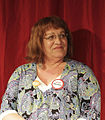
Back Portal:Transgender, Transsexualität und Geschlechtervielfalt German Portail:Transidentité French Portal:跨性别 Chinese
Welcome to the Transgender portal Being transgender is distinct from sexual orientation, and transgender people may identify as heterosexual (straight), homosexual (gay or lesbian), bisexual, asexual, or otherwise, or may decline to label their sexual orientation. The opposite of transgender is cisgender, which describes persons whose gender identity matches their assigned sex. Accurate statistics on the number of transgender people vary widely, in part due to different definitions of what constitutes being transgender. Some countries, such as Canada, collect census data on transgender people. Generally, fewer than 1% of the worldwide population are transgender, with figures ranging from <0.1% to 0.6%. Many transgender people experience gender dysphoria, and some seek medical treatments such as hormone replacement therapy, gender-affirming surgery, or psychotherapy. Not all transgender people desire these treatments, and some cannot undergo them for financial or medical reasons. The legal status of transgender people varies by jurisdiction. Many transgender people experience transphobia, or violence or discrimination towards transgender people, in the workplace, in accessing public accommodations, and in healthcare. In many places, they are not legally protected from discrimination. Several cultural events are held to celebrate the awareness of transgender people, including Transgender Day of Remembrance and International Transgender Day of Visibility, and the transgender flag is a common transgender pride symbol. (Full article...) Selected articleTransgender hormone therapy of the female-to-male type (FTM), also known as masculinizing hormone therapy, is a form of hormone therapy and sex reassignment therapy which is used to change the secondary sexual characteristics of transgender people from feminine (or androgynous) to masculine. It is one of two types of transgender hormone therapy (the other being male-to-female), and is predominantly used to treat transgender men and other transmasculine individuals. Some intersex people also receive this form of therapy, either starting in childhood to confirm the assigned sex or later if the assignment proves to be incorrect. The purpose of this form of therapy is to cause the development of the secondary sex characteristics of the desired sex, such as voice deepening and a masculine pattern of hair, fat, and muscle distribution. It cannot undo many of the changes produced by naturally occurring puberty, which may necessitate surgery and other treatments to reverse. The medications used for FTM therapy include, mainly, androgens (namely testosterone) and GnRH analogues... Selected biography Leelah Alcorn (November 15, 1997 – December 28, 2014) was an American transgender girl whose suicide attracted international attention. Alcorn had posted a suicide note to her Tumblr blog, writing about societal standards affecting transgender people and expressing the hope that her death would create a dialogue about discrimination, abuse and lack of support for transgender people. Assigned male at birth, she was raised in Ohio by a family affiliated with the Churches of Christ movement. At age 14, she came out as transgender to her parents, Carla and Doug Alcorn, who refused to accept her female gender identity. When she was 16, they denied her request to undergo transition treatment, instead sending her to Christian-based conversion therapy with the intention of convincing her to reject her gender identity and accept her gender as assigned at birth. After she revealed her attraction toward males to her classmates, her parents removed her from school and revoked her access to social media. In her suicide note, Alcorn cited loneliness and alienation as key reasons for her decision to end her life and blamed her parents for causing these feelings. She killed herself by walking into traffic on the Interstate 71 highway. Alcorn arranged for her suicide note to be posted online several hours after her death, and it soon attracted international attention across mainstream and social media. LGBT rights activists called attention to the incident as evidence of the problems faced by transgender youth, while vigils were held in her memory in the United States and United Kingdom. Petitions were formed calling for the establishment of "Leelah's Law", a ban on conversion therapy in the U.S., which received a supportive response from U.S. President Barack Obama. Within a year, the city of Cincinnati criminalised conversion therapy. Alcorn's parents were criticized for misgendering Leelah in comments that they made to the media, while LGBT rights activist Dan Savage blamed them for their child's death, and social media users subjected them to online harassment. Alcorn's parents defended their refusal to accept their child's identity and their use of conversion therapy by reference to their Christian values. Did you know (auto-generated) -
This month's birthdays
More did you know...
Random quoteWhen I was perceived as a black man I became a threat to public safety. When I was dressed as myself, it was my safety that was threatened. Related portalsSelected picturesTopics
CategoriesWikiProjects WikiProjects are non-hierarchical peer-run groups which serve as a resource for the communication on, and collaboration of, content within a specific topic area. Related WikiProjects: Things you can do
Associated WikimediaThe following Wikimedia Foundation sister projects provide more on this subject:
|
© MMXXIII Rich X Search. We shall prevail. All rights reserved. Rich X Search




























